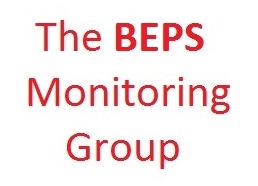
Nick Shaxson ■ BEPS Monitoring Group on curbing tax treaty abuses

 From the BEPS Monitoring Group, a TJN-backed civil society organisation tasked with monitoring the OECD’s so-called “Base Erosion and Profit Shifting” (BEPS) proposals to crack down on international corporate tax avoidance. The (wonkish but important) submission here concerns so-called “non-CIV” funds that are not collective investment vehicles. (Collective investment vehicles are entities that allow investors to pool their money and invest the pooled funds, rather than buying securities directly. CIVs include mutual funds, exchange traded funds and a few others; non-CIVs typically include private equity funds, hedge funds, trusts or other investment vehicles.) The submission here responds to “BEPS Action 6” which seeks to curb the abuse of tax treaties.
From the BEPS Monitoring Group, a TJN-backed civil society organisation tasked with monitoring the OECD’s so-called “Base Erosion and Profit Shifting” (BEPS) proposals to crack down on international corporate tax avoidance. The (wonkish but important) submission here concerns so-called “non-CIV” funds that are not collective investment vehicles. (Collective investment vehicles are entities that allow investors to pool their money and invest the pooled funds, rather than buying securities directly. CIVs include mutual funds, exchange traded funds and a few others; non-CIVs typically include private equity funds, hedge funds, trusts or other investment vehicles.) The submission here responds to “BEPS Action 6” which seeks to curb the abuse of tax treaties.
Summary
The BEPS Monitoring Group has now made a submission to the consultation on Non-CIV Funds, under BEPS Action 6 on preventing the granting of treaty benefits in inappropriate circumstances. Although presented in technical terms the proposals raise wider policy issues, since they could result in granting tax treaty benefits to hedge funds and private equity funds even if formed in tax havens. So there is a connection with the current concerns raised by the Panama Papers.
This consultation document concerns proposals put forward by interested parties and not the OECD’s Committee on Fiscal Affairs, which is now asking for comments. We regret that the document did not explain the policy issues, to facilitate a wider public engagement. This is especially important since the proposals concern the BEPS Action 6 measures to prevent treaty abuse, which are a core commitment for the expanding group of countries participating in the BEPS process, and may become a global standard through tax treaties.
Non-CIVs typically include private equity funds, hedge funds, trusts or other investment vehicles that generally do not have the key characteristics of CIVs. In particular, they are usually both unregulated and narrowly held, since they are aimed at sophisticated investors. Governments are therefore right to be concerned that these non-CIVs could be used to allow access to treaty benefits, in particular reduced withholding taxes at source, for investors who would not otherwise be entitled to such benefits, and who may be able to evade being taxed on such income.
We believe that any rules created to deal with these non-CIVs should require a positive demonstration by any non-CIV desiring treaty benefits that it can verify the bona fides of all its investors. To ensure taxation of income flowing through a fund which itself is exempt from tax, measures should be in place to ensure that its investors comply with their obligations to pay tax on payments to them from the fund. Hence, we consider that, to be eligible for treaty benefits, investment funds must be subject to
- Regulation which includes know-your-customer requirements, and
- Obligations to participate in comprehensive, automatic exchange of information for tax purposes.
Where, a fund is not itself able to verify the identity of all its customers because it receives investments from other funds, it must verify that its investors are subject to the same obligations.
This would provide an incentive to ensure that jurisdictions hosting financial centres comply with the appropriate global standards, not only for financial regulation, but more importantly in this context for preventing tax evasion.
In addition, it is critical that high threshold tests be set to ensure that eligible funds are in fact widely held and are genuinely channels for portfolio investment. In particular:
- No one investor or group of related investors should own above 1% of the fund,
- The fund should have a maximum of 10% of its assets in any one investment,
- It should not own more than 5% of any such investment, and
- A minimum of 95% of funds investing in such a fund should be entitled to the same or similar treaty benefits.
Read the full submission here.
Related articles

2025: The year tax justice became part of the world’s problem-solving infrastructure

‘Illicit financial flows as a definition is the elephant in the room’ — India at the UN tax negotiations

Tackling Profit Shifting in the Oil and Gas Sector for a Just Transition

Follow the money: Rethinking geographical risk assessment in money laundering

Democracy, Natural Resources, and the use of Tax Havens by Firms in Emerging Markets
One-page policy briefs: ABC policy reforms and human rights in the UN tax convention

The Financial Secrecy Index, a cherished tool for policy research across the globe

Vulnerabilities to illicit financial flows: complementing national risk assessments

Do it like a tax haven: deny 24,000 children an education to send 2 to school


